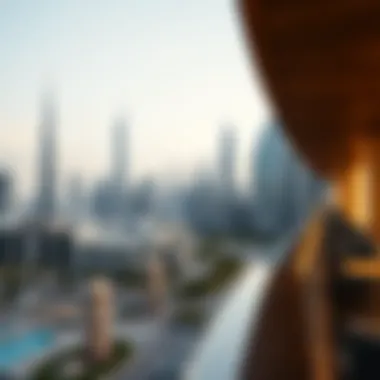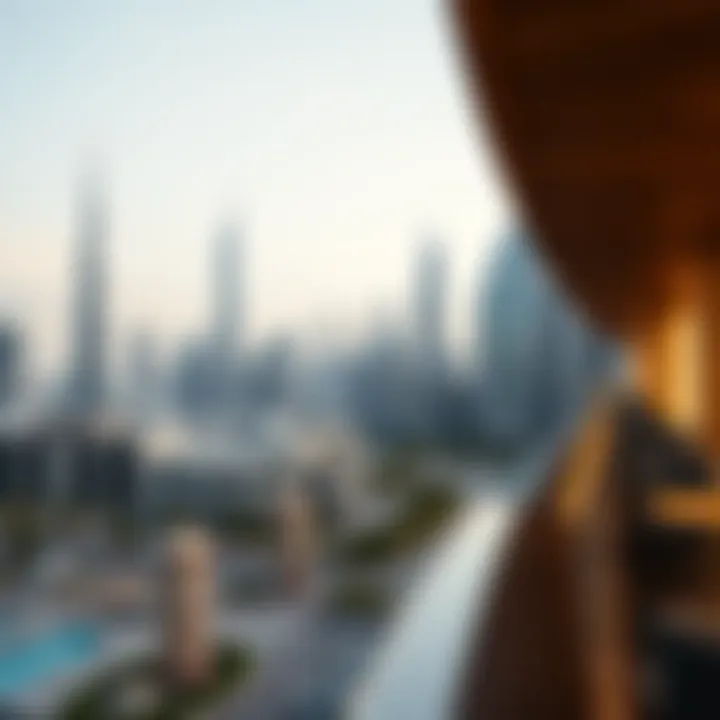Exploring Investment Opportunities in Dubai's Real Estate


Intro
As the sun sets over the skyline of Dubai, glistening towers of glass and steel reflect the vibrant energy of a city like none other. In recent years, Dubai's real estate scene has transformed itself into a bustling marketplace, drawing attention from both seasoned investors and newcomers alike. This article endeavors to peel back the layers of this dynamic sector, offering a close examination of the offerings within its ever-evolving landscape. With the potential for lucrative returns entwined with innovative architecture and strategic urban planning, the allure of investing in Dubai's properties is undeniable.
The narrative centers on the practical insights that matter most to various stakeholders in the realm of real estate—from expatriates looking for a home to architects keen on the latest trends, and developers mulling over untapped areas. By meticulously dissecting current market trends, property investment strategies, and pertinent legal frameworks, this guide aims to furnish readers with actionable insights that could not only inform their decisions but also inspire confidence amid the complexities of property ownership in the UAE.
Now, let us venture into the first major topic of discussion: the Market Insights that underpin Dubai's real estate investment landscape.
Overview of Dubai's Real Estate Market
Dubai's real estate market stands as a microcosm of the city’s rapid development and globalization. Understanding this landscape is crucial for anyone looking to make informed decisions regarding property investment. It serves not only as a booming hub for expatriates but also attracts investors with various backgrounds who see potential in this dynamic environment.
The sell and demand intertwining with the economic growth of the UAE make the local real estate segment vital. Economic indicators provide concrete facts, while cultural insights enrich the investors' perspectives. Emphasizing these elements in our exploration allows for a deeper comprehension of the nuances that shape this market.
Economic Indicators Influencing Real Estate
The economic fabric of Dubai's real estate is woven tightly with several indicators that signify market health. One cannot discuss this sector without considering GDP growth rates, inflation, and employment statistics. The UAE's push for diversification away from oil dependency-driven growth, particularly after the Expo 2020 event, has amplified investment in various sectors, including real estate.
For instance, the introduction of the 10-year visa for investors and skilled individuals has made Dubai a magnet for foreign investments. The property owners relish the stability these frameworks provide, ensuring potential return on investment remains within reach. Moreover, the fluctuation in interest rates on mortgages can create ripples in property demand, making it vital for potential investors to stay abreast of these economic fluctuations.
"Economic conditions are often viewed as the weather of the real estate market. A sunny day might provide the perfect conditions to make an investment, but knowing when gloomy clouds may roll in is essential for sustained success."
Cultural Factors Affecting Property Trends
Cultural nuances play a pivotal role in shaping the property market in Dubai. Given its diverse population, property trends often mirror the desires and needs of various cultural groups. An acute awareness of these preferences can significantly impact the types of properties that are in demand.
For example, some families might gravitate towards more suburban developments, seeking quiet residential areas with community features such as parks and schools. On the other hand, young professionals may lean toward high-rise apartments downtown, valuing proximity to their workplaces and social outlets.
Additionally, cultural festivities and local traditions can drive short-term demand spikes. During events such as Eid or the Dubai Shopping Festival, short-term rental markets might see a sudden surge. Investors should think ahead, channeling this knowledge into savvy property choices that align with seasonal trends.
In the grand scheme, acknowledging these economic indicators and cultural factors creates a holistic understanding of the Dubai real estate market, laying a solid foundation for both existing stakeholders and new entrants.
Key Characteristics of the Dubai Property Scene
Understanding the key characteristics of Dubai's property scene is paramount for anyone looking to dive into its bustling real estate market. This segment offers insight into the unique features that differentiate Dubai's properties, as well as the benefits and considerations tied to various types of real estate. Investors, realtors, architects, developers, and expatriates alike stand to gain valuable knowledge from this exploration.
Types of Properties Available
Residential Properties
Residential properties in Dubai offer a wide range of options, catering to different tastes and budgets. From high-rise apartments in bustling areas like Downtown Dubai to serene villas in gated communities like Arabian Ranches, the choices are plentiful. A key characteristic of these properties is their variety; potential buyers can find something that suits their lifestyle.
Residential investments typically yield stable rental income due to the continuous influx of expatriates and tourists. One unique feature of many residential developments is the inclusion of amenities such as swimming pools, gyms, and garden areas, which not only enhance living conditions but also attract tenants. However, competition can be fierce, and market saturation in certain neighborhoods has been a concern, making it essential for investors to conduct thorough market research before making a decision.
Commercial Properties
Moving to commercial properties, these are vital for businesses looking to establish a presence in one of the world’s fastest-growing economies. Dubai is home to modern skyscrapers that offer office spaces, retails establishments, and industrial zones. A significant highlight of commercial properties is the tax-free environment, which greatly benefits business owners.
These properties are often located in prime areas like Sheikh Zayed Road and Dubai Media City, making them a desirable choice. A unique factor here is the potential for long-term leases, which can secure steady revenue streams for investors. Still, potential investors need to be aware of economic shifts that could impact commercial demand, especially in times of uncerity.
Luxury Developments
Dubai is synonymous with luxury, and its luxury developments certainly exemplify that, drawing in affluent buyers and investors from around the globe. High-end properties such as those in Palm Jumeirah or the iconic Burj Al Arab show off extravagant lifestyles with unparalleled amenities, from private beaches to concierge services. The primary appeal of luxury developments lies in their exclusivity and status.
These properties often feature exquisite architectural designs and top-notch finishes, setting them apart from standard real estate offerings. However, such exclusivity comes at a high price, and investors must balance the potential for long-term value appreciation against the substantial initial investment and ongoing maintenance costs.
Architectural Styles in Dubai
Dubai's architectural scene is as diverse as its population, reflecting various aesthetic movements and cultural influences. The blend of traditional Middle Eastern motifs with cutting-edge modern designs creates a unique skyline that captivates not only residents but also tourists.
Many structures showcase an avant-garde style, where glass and steel dominate, embodying a vision of luxury and futurism. Yet, amidst these modern marvels, traditional styles such as Islamic architecture can be seen in places like Al Fahidi Historical Neighborhood, reminding visitors of the emirate's rich heritage. Investors should consider how architectural styles can influence property desirability and market value.
With these characteristics, Dubai’s real estate market presents a treasure trove of opportunities for those willing to navigate its complexities. Whether one is interested in residential, commercial, or luxury properties, understanding these key features is crucial for informed investment decisions.
Emerging Neighborhoods to Watch
The potential of real estate investment in Dubai is greatly enhanced when one pays close attention to emerging neighborhoods. With the city being a hub of innovation and rapid growth, identifying these up-and-coming areas can lead to lucrative investment opportunities. Investors and developers alike are increasingly recognizing the value of these neighborhoods, not only for their growth potential but also for their cultural and social significance.


Dubai Creek Harbour
Dubai Creek Harbour stands as a testament to what visionary planning can achieve in real estate. This ambitious development is not just a neighborhood; it’s a complete lifestyle destination that marries the city’s rich history with modern living. Set along the water's edge, it unveils breathtaking waterfront views, promenades, and green spaces. Key elements here include:
- Proximity to Downtown: Positioning itself as a mere 10-minute drive from Downtown Dubai, it offers commuters a quick route to the city’s central attractions.
- Iconic Landmarks: The anticipated Dubai Creek Tower is set to eclipse the Burj Khalifa, creating a new architectural icon in the skyline.
- Community Focus: Developers are prioritizing communal spaces, parks, and recreational facilities to create a family-friendly environment.
Such features create an attractive package for families and investors alike, which can lead to sustained property appreciation in the future.
Dubai Hills Estate
Dubai Hills Estate has quickly emerged as one of the most sought-after destinations for affluent investors and discerning homeowners. This master-planned community, part of the larger Mohammed Bin Rashid City development, offers a unique blend of luxury and nature. Its appeal lies in several standout aspects:
- Integrated Living: The inclusion of schools, healthcare, and various shopping options within the community brings convenience to daily living, attracting families.
- Green Spaces and Parks: Designed with sustainability in mind, it boasts numerous parks and connected green corridors that enhance residents' quality of life.
- Luxury Lifestyle: From high-end villas to stunning apartments, the housing options cater to an upscale clientele looking for premium living experiences.
Investing here isn’t just about acquiring property; it’s about joining a community that is built on the principles of sophistication and sustainability.
Jumeirah Village Circle
Jumeirah Village Circle, or JVC, is often overlooked yet brimming with potential. This vibrant district encapsulates a community spirit with a mix of residential and leisure options. What makes JVC intriguing for investors is:
- Affordability: Compared to other neighborhoods, JVC presents a more budget-friendly entry point, appealing to first-time investors and those seeking value.
- Community Amenities: A plethora of parks, schools, and retail spaces are emerging, enhancing the neighborhood's liveability and attracting young families.
- Connectivity: Its strategic location provides easy access to major roads, making commutes to key business districts straightforward and efficient.
By focusing on these aspects, JVC is poised for growth, ensuring that investing here might yield significant returns in the years to come.
"Understanding the pulse of emerging neighborhoods is critical for anyone looking to invest in Dubai's dynamic property market. Opportunities abound for those willing to dig a little deeper into these vibrant communities." – Industry Expert
In summary, keeping an eye on these emerging neighborhoods in Dubai is not just a wise investment strategy but an opportunity to be part of the city's exciting transformation. Investors should actively monitor these regions to grasp the full spectrum of potential they hold.
Investment Strategies for Success
When diving into Dubai's pulsating real estate market, it’s paramount for potential investors to understand the various strategies that can turn property investments from potential risks into profitable ventures. The landscape here is not just about buying properties; it’s about crafting a well-thought-out plan that considers factors like market dynamics, personal financial goals, and regulatory requirements. Whether you’re a seasoned investor or a first-timer, this section delves into the key investment strategies that can pave the way for success in Dubai's highly competitive arena.
Long-Term Investment Approaches
Long-term investments often resemble the tortoise in the race—slow and steady wins. By planning for the long haul, investors can benefit from property appreciation over time and capitalize on rental yields. In a city like Dubai, where developments are continually on the rise, this approach allows one to ride the waves of economic growth and increasing property values.
Investors inclined towards long-term strategies often focus on buying properties in areas that project substantial development in the coming years. Locations like Dubai Creek Harbour and Dubai Hills Estate are not just new developments; they are areas set to redefine the city's skyline and lifestyle. Holding property during this transition phase often means lucrative returns.
"Investing for the long-term is about having a vision and willingness to wait for growth, knowing that real estate is not just about prices but also about the community and lifestyle you build around it."
Flipping Properties for Quick Returns
Flipping properties can be quite the thrill for investors who enjoy a hands-on approach. This strategy encompasses the buying of properties needing renovation and selling them at a profit post-refurbishment. In Dubai, where the demand for luxury and unique properties is high, savvy investors can find opportunities to purchase undervalued properties, spruce them up, and flip them within a relatively short time.
This method, however, is not without its pitfalls. Investors must accurately gauge renovation costs and potential market demand for their revamped properties. An area that's buzzing with new developments offers a fertile ground for flipping, especially in neighborhoods like Jumeirah Village Circle. Here, the upsurge in young families looking for affordable yet attractive housing creates a ripe market.
Rental Market Considerations
The rental market in Dubai is thriving, bolstered by the influx of expatriates and tourists. Understanding this market is crucial for investors looking to derive steady income from their properties. Rental yield can significantly vary depending on the area, property type, and even the season.
A notable aspect to consider is the demographic shifts in Dubai. Young professionals are increasingly looking for properties close to their workplaces, while families often prefer larger homes near schools and parks. Understanding these preferences allows investors to tailor their properties accordingly, ensuring quicker rentals and higher returns.
However, investors should also be cautious of market saturation. Certain areas might have an influx of rental properties, leading to fierce competition and possibly lower rental prices. Balancing demand with supply is essential to maintain a profitable rental strategy.
As potential investors learn the ropes of Dubai's real estate landscape, incorporating these strategies into their investment philosophy can be a game changer. A well-rounded approach that combines long-term planning, short-term flipping agility, and acute awareness of the rental dynamics can lead to successful and profitable investment outcomes.
Understanding Market Trends
In any market, especially one like Dubai's real estate, keeping a finger on the pulse of market trends is essential. The real estate landscape is more dynamic than a playground seesaw—sometimes it tilts in favor of buyers, other times, it's the sellers who are doing the heavy lifting. Understanding market trends equips investors with the strategic insight needed to make informed decisions, anticipate fluctuations, and navigate the vast sea of possibilities.
By mastering the ebb and flow of property prices, demand patterns, and global influences, investors can turn potential pitfalls into profitable opportunities. This section will explore critical elements such as price fluctuations and demand indicators while also examining how international events can affect local real estate markets.
Price Fluctuations and Demand Indicators
Price fluctuations in Dubai's real estate can resemble a roller coaster ride, complete with ups, downs, and a few unexpected turns. Investors need to be aware that property prices are not static; they are influenced by a multitude of factors including economic stability, population growth, and even seasonal variations in demand. For instance, when new businesses set up shop in the area, we often witness a surge in housing demand, which can drive prices up significantly.
Moreover, tracking demand indicators is like having a treasure map in your pocket. Useful tools such as the Dubai Land Department's property transaction records can provide insights into prevailing price trends, showing which areas are hot and which ones are not. Here’s how to decipher these signals:


- Increased Transactions: A rising number of property sales can hint towards a booming market, signaling confidence among buyers.
- Rental Price Changes: Shifts in rental prices often reflect broader demand trends. If rents are climbing, it could indicate a strong interest in the area, making it a hotspot for both investors and tenants.
- Absorption Rate: This measures how quickly properties are sold in a given market. A lower absorption rate might mean a sluggish market, while a higher rate suggests brisk activity.
"Understanding price trends is not about playing a guessing game; it’s about using the right tools to navigate the waters of investment and make educated decisions."
Impact of Global Events on Real Estate
The global interconnectedness of markets means that events far from Dubai can send ripples through its real estate sector. Whether it’s a pandemic, economic downturn, or international policy changes, investors must remain vigilant and adaptable. For example, the COVID-19 pandemic drastically altered buyer preferences, with many now seeking properties that offer home office spaces or access to outdoor amenities. This shift has had tangible effects on certain developments and prompted landlords and developers to rethink their strategies.
Consider the following aspects when assessing the impact of global happenings on Dubai's real estate:
- Economic Downturns: A global recession can lead to job losses, reducing the number of potential buyers in Dubai and putting downward pressure on prices.
- Regulatory Changes: International sanctions or trade agreements can also influence the market, affecting property value and attractiveness to foreign investors.
- Investment Trends: An increase in foreign investment or stricter visa regulations can change demand dynamics, thus influencing prices and property availability.
In summary, a keen insight into both local pricing dynamics and global influences can enable investors to make astute and timely decisions. By understanding these market trends, they can not only safeguard their investments but potentially maximize returns in an ever-evolving landscape.
Legal and Regulatory Framework
Understanding the legal and regulatory framework surrounding Dubai's real estate market is crucial for both local and international investors. It’s like knowing the rules of the game before you step onto the field. Without this knowledge, you can find yourself in a situation that may lead to losses, or worse, legal complications. Property transactions in Dubai are underpinned by a set of laws and regulations that govern everything from ownership rights to taxation. Being familiar with these laws is not just beneficial; it is essential for making informed and secure investment decisions.
Property Ownership Laws in Dubai
In Dubai, property ownership laws have evolved significantly over the years. One of the standout features is the 2002 law allowing foreign investors to own property in designated areas, which created a surge in international interest. The two primary types of property ownership are freehold and leasehold. Freehold ownership allows investors to own the property and the land it sits on, whereas leasehold means that the investor can only own the building for a fixed number of years, which is typically 99 years.
Here are some key points involving property ownership laws:
- Freehold Areas: Investors can own properties in certain areas like Dubai Marina, Downtown Dubai, and Palm Jumeirah.
- Leasehold Areas: Properties outside designated areas are generally leasehold, which can carry different implications for long-term investors.
- Development Restrictions: Some developments have specific restrictions that may not allow resale or sub-letting.
Being well-acquainted with these nuances can save potential issues down the line.
Rights of Foreign Investors
When it comes to foreign investors, Dubai offers a welcoming landscape. The rights of foreign investors are generally robust, but they do come with their own set of stipulations and conditions. For instance, foreign investors have the right to own 100% of their property in designated freehold areas. However, there are some limitations on things like property size and type.
Important considerations for foreign investors include:
- Residency Visa: Purchasing property worth a specified amount can lead to a residency visa, allowing for greater flexibility.
- Property Management: Foreign investors often form partnerships with local real estate firms to navigate the specifics of property management and regulations.
- Tax Obligations: Knowing the tax implications is vital, as some investors may face unique financial responsibilities depending on their citizenship.
Understanding your rights as a foreign investor enables you to seize opportunities effectively. Failure to comprehend these can lead to frustration.
In summary, the legal and regulatory framework surrounding Dubai's real estate market is foundational to success in this dynamic landscape. Investors must arm themselves with knowledge about ownership laws and foreign investor rights to facilitate smooth transactions and avoid missteps.
For further detail on property regulations and investor rights, resources such as Dubai Land Department and Gulf News Real Estate can be invaluable.
Financing Real Estate Investments
In the landscape of Dubai’s real estate market, the avenue of financing is pivotal for both seasoned and new investors. It holds the key to unlocking potential opportunities while also managing risks effectively. Understanding financing options is not just about getting funding; it's about leveraging these resources smartly to maximize returns on investments. Investors need to know the nuances of the mortgage and loan landscape while also considering collaboration through partnerships and joint ventures that can significantly mitigate financial burdens.
Mortgages and Loan Options
Mortgages in Dubai offer a plethora of options tailored to different kinds of investors. Interest rates, terms, and down payments can vary, making knowledge essential. Usually, local banks like Emirates NBD and Abu Dhabi Commercial Bank provide competitive mortgage solutions. Investors often have choices between fixed-rate and variable-rate mortgages. Fixing the interest keeps payments stable over time, a useful strategy if one anticipates fluctuating market conditions.
- Fixed-rate Mortgages: Offer consistency, as the rate remains unchanged throughout the loan’s term.
- Variable-rate Mortgages: These can start lower but can increase based on market trends; thus, diligent monitoring is needed.
It’s essential to factor in other costs such as insurance and mortgage registration fees, which can add up and affect overall financing costs. Furthermore, bespoke loan options for expatriates might slightly differ, often requiring more documentation than local residents. This additional scrutiny reflects the bank’s requirement to ensure that the borrower is financially sound in an unfamiliar environment.
Moreover, mortgage providers may require potential borrowers to demonstrate adequate income and credit history. The thresholds can be rigorous, reflecting the perceived risk associated with property investments in Dubai’s burgeoning market.
Investment Partnerships and Joint Ventures
Navigating the real estate landscape can be daunting, especially for individual investors. Here, investment partnerships and joint ventures shine as practical solutions. This type of financing allows multiple stakeholders to pool resources, thereby reducing the individual financial burden. Pics speak louder than words; just look at numerous luxury developments that were birthed from successful collaborations.
The benefits of engaging in partnerships are manifold:
- Risk Mitigation: Sharing the cost lowers the stakes for any one investor.
- Resource Pooling: Offers access to broader expertise and investor networks that can lead to more informed decision-making.
- Enhanced Buying Power: Combined investments can lead to acquisition of larger or more lucrative properties.
However, it’s crucial to approach joint ventures with due diligence. A clear contractual agreement outlining each party's roles, responsibilities, and share of profits is non-negotiable. Furthermore, it’s wise to engage in a level of compatibility check between potential partners. Their investment philosophies, timelines, and financial capabilities should align to avoid conflicts later.
The key to ROI in Dubai’s dynamic real estate market is not just in having capital, but in knowing how to best utilize it.


For more insights on financing options and strategies in real estate, consider visiting Emirates NBD or exploring resources on Dubai Land Department.
Market Risks and Considerations
Navigating the real estate market in Dubai can feel like trying to steer a ship through a stormy sea. Understanding market risks and considerations is vital for anyone looking to invest, whether this is your first time or you are a seasoned investor. Knowing what you are up against helps to make informed decisions that can mean the difference between a profitable venture and financial loss.
Economic Uncertainty and Its Impact
Economic uncertainty acts as a wild card in the real estate deck. Factors like fluctuating oil prices, geopolitical tensions, and global economic indicators can send ripples through Dubai's property market. Investors should keep an eye on trends such as:
- Inflation rates: A sudden rise in inflation can impact purchasing power, making properties less affordable.
- Employment rates: A decline in job security can lead to decreased demand for residential rentals.
- International trade relations: Changes in trade agreements can result in economic shifts that affect property values.
For instance, when the COVID-19 pandemic reared its head, many investors watched helplessly as economic activity ground to a halt. Properties that sat unsold for months illustrated the harsh reality of how external factors could sway market dynamics.
Market Saturation Issues
Market saturation takes place when the supply of available properties overshoots demand. This can lead to declining rental yields and property values. The landscape can quickly change, so it’s crucial to be aware of indicators suggesting oversaturation. Here are a few signs to look out for:
- High vacancy rates: An increase in empty apartments may point towards oversupply.
- Decreased property sales: If properties remain on the market for months without interest, it can signal a waning appetite among buyers.
- Price reductions: Sellers lowering prices frequently could indicate problems within the market.
Investors considering luxury developments must particularly be cautious. An influx of high-end properties in a saturated sector can drive prices down further, impacting both resale value and rental income.
It's prudent to conduct thorough market research and trend analysis to identify the equilibrium of supply and demand before making your move.
Lifestyle Factors Influencing Property Choices
In the bustling world of Dubai's real estate, the lifestyle choices of potential buyers and renters have become pivotal. These factors greatly influence property selection and can determine not just the attractiveness of a property, but also its value in the long run. Investors need to be aware that the appeal of a location goes beyond mere bricks and mortar; it often links closely to the lifestyle preferences of the target market.
Understanding lifestyle factors offers a comprehensive glimpse into why certain neighborhoods thrive while others languish. For instance, families may prioritize access to schools and parks, while young professionals might seek vibrant nightlife and proximity to workplaces. Recognizing these nuances helps investors make informed decisions about where to allocate their resources.
Proximity to Amenities
One of the fundamental elements influencing property choices in Dubai is the proximity to various amenities. Access to shopping centers, healthcare facilities, educational institutions, parks, and transportation hubs plays a significant role in desirability. Properties that offer close proximity to these services typically command better prices and tend to retain their value more effectively over time.
Consider communities like Dubai Marina, where residents enjoy a plethora of dining options, recreational facilities, and the marina itself – all within a short walking distance. This convenience not only enhances the quality of life but also becomes a key selling point for real estate agents.
- Shopping: Malls like The Mall of the Emirates provide a one-stop-shop experience, which attracts buyers seeking lifestyle over mere living space.
- Healthcare: Availability of advanced healthcare makes a community more attractive to families and expatriates.
- Transportation: Proximity to metro stations or major highways is crucial for commuters, adding value to properties that boast easy access to public transport.
Community Features and Activities
Another facet shaping property decisions is the community’s features and activities. A neighborhood that fosters community engagement and offers a range of recreational options tends to draw in long-term residents. Noteworthy amenities include gyms, pools, social clubs, and organized community events.
Properties within these vibrant communities typically see lower turnover rates and a stronger sense of belonging among residents. One example is the growth of Dubai's gated communities, like Arabian Ranches, which features a golf course, walking trails, and family events. Such features not only enhance the living experience but also make these properties highly sought after.
- Social Clubs: These create a welcoming environment, encouraging interaction between residents.
- Events: Regular community activities or festivals can foster a strong communal identity, making properties more attractive.
- Safety Features: Gated communities often provide enhanced security, a significant consideration for families and expatriates.
"In Dubai, the quality and accessibility of lifestyle amenities can often elevate a property's value beyond its physical characteristics."
In summary, understanding lifestyle factors provides invaluable insights for investors looking to navigate the complex real estate waters of Dubai. Proximity to amenities and the characteristics of the community significantly influence property choices, rendering these factors essential in assessing investment opportunities. Investors who take these elements into account stand a better chance of making sound decisions that resonate with buyers' needs and preferences.
The Future of Dubai’s Real Estate
The landscape of Dubai’s real estate is continually evolving, with factors such as technological advancements and sustainability trends reshaping the market. Understanding the future of this market is crucial for investors, realtors, and developers who wish to make informed decisions. As competition intensifies and consumer preferences shift, it's imperative to stay ahead of the curve by embracing innovation and sustainability.
By paying attention to these emerging trends, stakeholders can better position themselves for long-term profitability and growth. Growth in the real estate sector impacts not only investors but also the wider economy, creating job opportunities and promoting overall development.
Emerging Technologies in Real Estate
Technology is revolutionizing the way real estate operates in Dubai. From virtual reality property tours to advanced data analytics, investors are leveraging these tools to enhance their decision-making processes. Consequently, understanding how these technologies work is essential for anyone looking to invest in Dubai's market.
- Virtual and Augmented Reality: Potential buyers can now explore properties from the comfort of their homes. This feature significantly reduces the time and effort required in property hunting.
- Blockchain Technology: By utilizing blockchain, transactions can become more transparent and secure. This technology minimizes fraud, establishes trust, and simplifies property transfers.
- Data Analytics for Market Insights: Investors benefit from data-driven insights that reveal emerging trends in property pricing and demand. This quantitative approach allows for smarter investment decisions.
The future evidently relies on these technological innovations, and those who embrace them will have a competitive advantage.
Sustainability and Eco-Friendly Developments
Sustainability isn’t just a buzzword; it’s a necessity that’s garnering attention in Dubai's real estate scene. Eco-friendly initiatives and sustainable developments are becoming more popular among investors and buyers, who are increasingly aware of their environmental impact.
- Green Building Standards: Projects that meet Dubai’s green building regulations benefit not only from marketability but also from energy savings that can offset initial development costs. Developers focusing on eco-friendly materials and energy-efficient technologies are likely to attract a growing demographic of eco-conscious investors.
- Sustainable Communities: Neighborhoods that incorporate urban farming, renewable energy sources, and eco-friendly transportation options will be at the forefront of future developments. Properties in these areas can command a premium as buyers prioritize sustainability.
The shift towards sustainability brings along a host of benefits while also reflecting changing consumer preferences. Investors who understand and adapt to these shifts can expect to find lucrative opportunities in eco-friendly developments.
As trends continue to shift towards technological innovation and sustainability, investors must remain adaptable to secure their positions in Dubai’s real estate market.
By recognizing these advancements and integrating them into their strategies, real estate professionals can harness the potential of Dubai’s future landscape.















